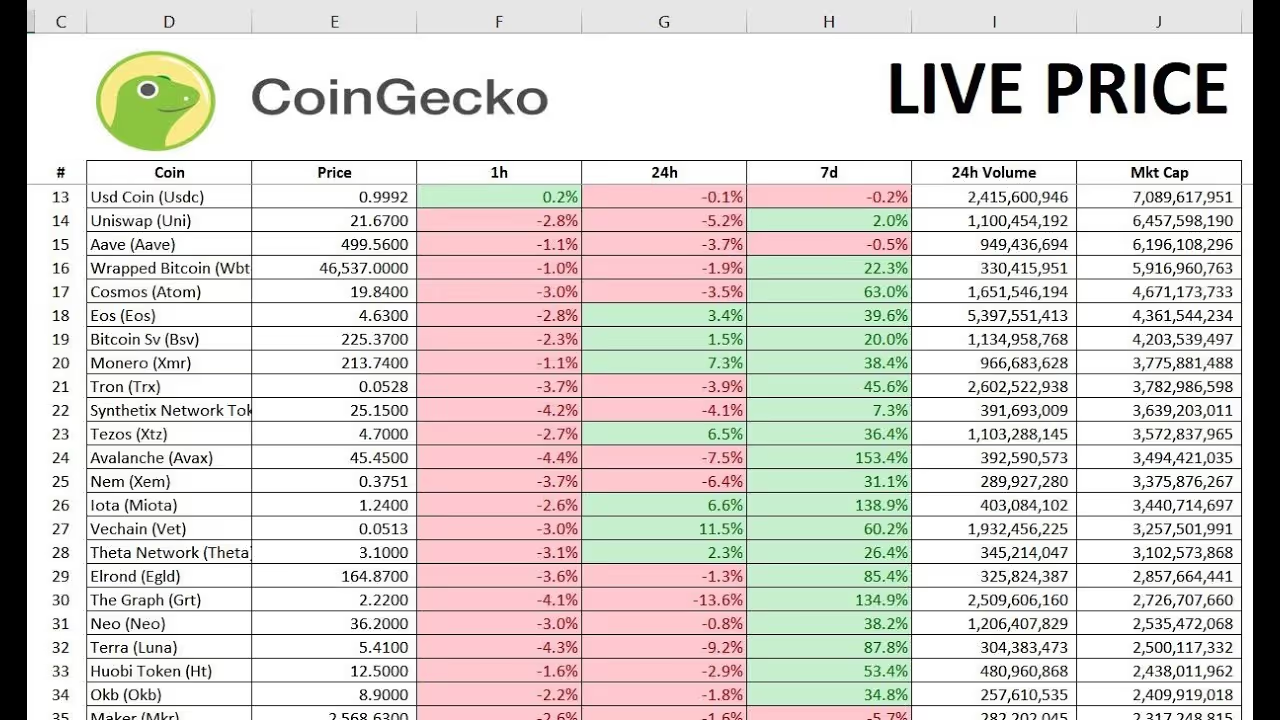.avif)
Calculate Your Crypto
Taxes in Minutes
.avif)
Want to download your crypto data in Excel? In this comprehensive guide, we will provide you with step-by-step instructions on how to effortlessly download cryptocurrency pricing and transaction history data directly into an Excel spreadsheet.
By following this process, you will be able to quickly generate a CSV file using Kryptos that contains detailed information about your cryptocurrency transactions from various wallets and exchanges to effectively manage your crypto portfolio.
Is It Possible to Import Real-Time Cryptocurrency Prices into Excel?
If you are a Microsoft 365 subscriber, you have the advantage of leveraging Excel's built-in functionality to retrieve cryptocurrency prices.
Presently, Excel supports several popular cryptocurrencies, including Bitcoin (BTC), Bitcoin Cash (BCH), Litecoin (LTC), Ripple (XRP), and Ethereum (ETH).
The flexibility of Excel allows you to view cryptocurrency prices in your preferred fiat currency, such as USD, EUR, CAD, and more.

For instance, you can input the cryptocurrency symbol pair, such as BTC/USD, into a cell, and Excel will interpret it as a valid request, fetching the corresponding price data. Moreover, Excel offers the “STOCKHISTORY” function, enabling you to access historical cryptocurrency prices at daily, monthly, and weekly intervals.
Remember that Excel has certain limitations concerning cryptocurrencies. It does not support an extensive range of cryptocurrencies, and it is unable to import transaction data directly from your wallets and exchanges.
Does Excel Offer Integration with Cryptocurrency Exchanges and Wallets?
Excel lacks the capability to facilitate the automatic importation of your transactions from popular exchanges like Coinbase or blockchains such as Ethereum.
This limitation can pose challenges when it comes to maintaining an organized record of your cryptocurrency transactions, including crucial details like the price of your crypto at the time of receipt and disposal, as well as the specific date and time of these transactions.

Fortunately, a solution exists to streamline this process. Crypto software like Kryptos offers a convenient alternative by allowing you to automate the importation of your trades and effortlessly download your cryptocurrency data directly onto an Excel spreadsheet.
Where Can I Access Reliable Sources to Download Cryptocurrency Data?
With Kryptos, you can easily manage and track your transaction history, ensuring accurate and up-to-date records of your cryptocurrency portfolio.
Follow these easy steps to effortlessly generate a CSV file compatible with Microsoft Excel, containing all your crypto transactions:
1. Integrate your wallets and exchanges with Kryptos.
2. Sit back and let Kryptos automatically import and consolidate your transaction records.
3. With just a few clicks, download the CSV file, which contains a wealth of information about your crypto transactions.

You now possess a fully organized spreadsheet that serves as a complete record of your crypto transaction history. Notably, the CSV file includes crucial details like the price of your cryptocurrency at the time of disposal and receipt.
Streamline Your Crypto Management with Kryptos
Wondering the best way to track and manage your crypto assets?
This is where powerful crypto tax software like Kryptos can help. It offers an intuitive platform for tracking your crypto portfolio and facilitates seamless reporting of crypto taxes.
Simply import the wallet or exchange to the platform and easily manage your portfolio, track capital gains and losses, implement tax-saving strategies and ensure compliance with tax regulations.
Sign Up for a free account now and experience the convenience that comes with efficient crypto transaction management.
FAQs
1. Can you get crypto Data in Excel?
Yes, you can get crypto data in Excel. There are several methods to do this, including using APIs provided by various cryptocurrency exchanges, downloading CSV files directly from platforms, or utilizing Excel's built-in data import tools like Power Query. Some third-party add-ins specifically cater to importing cryptocurrency data into Excel.
2. How do I download Cryptocurrency Data?
Downloading cryptocurrency data can be done through several methods:
- APIs: Many exchanges provide APIs that allow you to fetch real-time or historical data. You would need some programming knowledge to interact with these APIs.
- CSV Files: Some platforms offer the ability to download data directly as a CSV file, which can be easily imported into Excel.
- Web Scraping: This involves extracting data from websites. It may require technical skills and an understanding of the website's structure.
- Third-Party Tools: These types of software can help you download and import cryptocurrency data into Excel or other spreadsheet software.
3. How do I add crypto prices in Excel?
Adding crypto prices in Excel can be done through:
- Real-Time Data Feeds: Utilizing APIs or add-ins that provide real-time data feeds to Excel. This may require some setup and possibly a subscription to a data service.
- Manual Input: If real-time data isn't needed, you can manually input prices or copy-paste them from a website.
- Importing CSV Files: Many platforms allow you to download price data as a CSV file, which you can then import into Excel.
4. Can I download data from Binance?
Yes, Binance provides both APIs and direct CSV file downloads for various types of data, including trading pairs, historical price data, order book data, and more.
All content on Kryptos serves general informational purposes only. It's not intended to replace any professional advice from licensed accountants, attorneys, or certified financial and tax professionals. The information is completed to the best of our knowledge and we at Kryptos do not claim either correctness or accuracy of the same. Before taking any tax position / stance, you should always consider seeking independent legal, financial, taxation or other advice from the professionals. Kryptos is not liable for any loss caused from the use of, or by placing reliance on, the information on this website. Kryptos disclaims any responsibility for the accuracy or adequacy of any positions taken by you in your tax returns. Thank you for being part of our community, and we're excited to continue guiding you on your crypto journey!
| Step | Form | Purpose | Action |
|---|---|---|---|
| 1 | 1099-DA | Reports digital asset sales or exchanges | Use to fill out Form 8949. |
| 2 | Form 1099-MISC | Reports miscellaneous crypto income | Use to fill out Schedule 1 or C. |
| 3 | Form 8949 | Details individual transactions | List each transaction here. |
| 4 | Schedule D | Summarizes capital gains/losses | Transfer totals from Form 8949. |
| 5 | Schedule 1 | Reports miscellaneous income | Include miscellaneous income (if not self-employment). |
| 6 | Schedule C | Reports self-employment income | Include self-employment income and expenses. |
| 7 | Form W-2 | Reports wages (if paid in Bitcoin) | Include wages in total income. |
| 8 | Form 1040 | Primary tax return | Summarize all income, deductions, and tax owed. |
| Date | Event/Requirement |
|---|---|
| January 1, 2025 | Brokers begin tracking and reporting digital asset transactions. |
| February 2026 | Brokers issue Form 1099-DA for the 2025 tax year to taxpayers. |
| April 15, 2026 | Deadline for taxpayers to file their 2025 tax returns with IRS data. |
| Timeline Event | Description |
|---|---|
| Before January 1, 2025 | Taxpayers must identify wallets and accounts containing digital assets and document unused basis. |
| January 1, 2025 | Snapshot date for confirming remaining digital assets in wallets and accounts. |
| March 2025 | Brokers begin issuing Form 1099-DA, reflecting a wallet-specific basis. |
| Before Filing 2025 Tax Returns | Taxpayers must finalize their Safe Harbor Allocation to ensure compliance and avoid penalties. |
| Feature | Use Case Scenario | Technical Details |
|---|---|---|
| Automated Monitoring of Transactions | Alice uses staking on Ethereum 2.0 and yield farming on Uniswap. Kryptos automates tracking of her staking rewards and LP tokens across platforms. | Integrates with Ethereum and Uniswap APIs for real-time tracking and monitoring of transactions. |
| Comprehensive Data Collection | Bob switches between liquidity pools and staking protocols. Kryptos aggregates all transactions, including historical data. | Pulls and consolidates data from multiple sources and supports historical data imports. |
| Advanced Tax Categorization | Carol earns from staking Polkadot and yield farming on Aave. Kryptos categorizes her rewards as ordinary income and investment income. | Uses jurisdiction-specific rules to categorize rewards and guarantee compliance with local tax regulations. |
| Dynamic FMV Calculation | Dave redeems LP tokens for Ethereum and stablecoins. Kryptos calculates the fair market value (FMV) at redemption and during sales. | Updates FMV based on market data and accurately calculates capital gains for transactions. |
| Handling Complex DeFi Transactions | Eve engages in multi-step DeFi transactions. Kryptos tracks value changes and tax implications throughout these processes. | Manages multi-step transactions, including swaps and staking, for comprehensive tax reporting. |
| Real-Time Alerts and Updates | Frank receives alerts on contemporary tax regulations affecting DeFi. Kryptos keeps him updated on relevant changes in tax laws. | Observe regulatory updates and provide real-time alerts about changes in tax regulations. |
| Seamless Tax Reporting Integration | Grace files taxes using TurboTax. Kryptos integrates with TurboTax to import staking and yield farming data easily. | Direct integration with tax software like TurboTax for smooth data import and multi-jurisdictional reporting. |
| Investor Type | Impact of Crypto Tax Updates 2025 |
|---|---|
| Retail Investors | Standardized crypto reporting regulations make tax filing easier, but increased IRS visibility raises the risk of audits. |
| Traders & HFT Users | To ensure crypto tax compliance, the IRS is increasing its scrutiny and requiring precise cost-basis calculations across several exchanges. |
| Defi & Staking Participants | The regulations for reporting crypto transactions for staking rewards, lending, and governance tokens are unclear, and there is a lack of standardization for decentralized platforms. |
| NFT Creators & Buyers | Confusion over crypto capital gains tax in 2025, including the taxation of NFT flips, royalties, and transactions across several blockchains. |
| Crypto Payments & Businesses | Merchants who take Bitcoin, USDC, and other digital assets must track crypto capital gains for each transaction, which increases crypto tax compliance requirements. |
| Event | Consequences | Penalties |
|---|---|---|
| Reporting Failure | The tax authorities can mark uncontrolled revenues and further investigate. | Penalty fines, interest on unpaid taxes and potential fraud fees if they are deliberately occurring. |
| Misreporting CGT | Misreporting CGT Error reporting profits or losses can trigger the IRS audit. | 20% fine on under -ported zodiac signs, as well as tax and interest. |
| Using decentralized exchanges (DEXs) or mixers without records | The IRS can track anonymous transactions and demand documentation. | Possible tax evasion fee and significant fine. |
| Disregarding Bitcoin mining tax liabilities | Mining reward is considered taxable income, and failure of the report can be regarded as tax fraud. | Further tax obligations, punishment and potential legal steps. |
| Foreign crypto holdings: Non-disclosure | Foreign-accepted crypto FATCA may be subject to reporting rules. | Heavy fines (up to $ 10,000 per fracture) or prosecution for intentional non-transport. |
File Your Crypto Tax in Minutes









